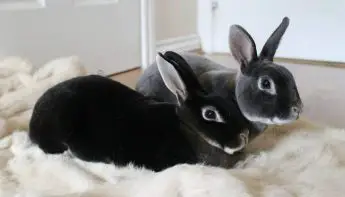Introduction
Quick Navigation
The Mini Rex rabbit without speaking of the stunning, plush fur of the breed. Rationed only with the Rex rabbit, touching either breed is an ordeal you won’t disregard. Mini Rex is a portable breed. They often weigh approximately 4.5 pounds. The fur and small size might be rationales why Mini Rex is prominent. They are one of the breeds that evolved in the United States and attained commendation in 1988, which is relatively newly described by most other rabbit species.
See here for more details
The unusual, plush fur of the Mini Rex is the breed’s logo.
It’s all about the fur with either the Mini Rex or regular Rex’s rabbit breeds simply because it’s so elegant and lovely to touch. The fur struts upright. The sentry hairs and undercoat are similar in lengths. It’s unique fur. Once you feel it, you never bypass it.
People have often been lovers of the Rex fur, but not all society are lovers of the size of the regular Rex, which weighs about 10.5 pounds. The fad in the last few decades is toward smaller breeds. The Mini Rex breed has an utmost weight of 4.5 pounds.
The breed criterion for Mini Rex stipulates that it has a portable, proportional, smooth body. The ears are straight and near together. The standard for shoulders, stomach, and hindquarters signs for them to be solid and well-filled.
See more here for reference
A fascinating video on YouTube indicate the discrepancies between two top Mini Rex’s adversaries at a rabbit show and motives why points are augmented or subtracted.
Colours
The touch of their fur is remarkable, but another incredible piece of information about Mini Rex is that they land in a large assortment of colours, almost 20. The American Rabbit Breeders Association acknowledged colours comprise the black, blue, blue-eyed, white, broken group, castor, chinchilla, chocolate, Himalayan, lilac, lynx, opal, otter, red, sable point, seal, silver marten, smoke pearl, tortoise, and white. Add in the numerous colours from the unsteady group, and there are many more than 20 to select from.
History
The history of the Mini Rex starts up with Monna Berryhill in Texas. In 1984, she accepted a Dwarf Rex and crossbred it with a lynx Rex. By 1986, she submitted the first Mini Rex at the annual ARBA convention. It was a castor Mini Rex, and ARBA authorised a working criterion for the breed. In 1987 and 1988, Berryhill submitted again, upholding both times. Meanwhile, other rabbit breeders began raising different species in 1987. The Mini Rex was approved as a breed in 1988, with multiple varieties ready with extra put in over the years.
See also for more information
Rabbits further want enrichment and relations. Toys, scrutinising time, and playtime by themselves, with other pets and with you satisfies these needs. Predict to give your Mini Rex day-to-day interest well beyond providing food and offering a few pats on the head. Play with your Mini Rex on their terms. Rabbits usually don’t like being picked up but are pleased to play games on the floor or jump on you if you sit on the floor.
Regular cage/habitat cleaning assists to keep your Mini Rex healthy. Customary tidings are required for the litter box, food bowls, and water bottles.
Rabbits train themselves, aside from cutting off their nails, which you, a teacher, or your vet must do. Owners should wash their Mini Rex routinely. Reducing the fur, a Mini Rex ingests helps stave off hairballs from cropping up in the gastrointestinal tract.
Health
Mini Rex rabbits are liable to the typical rabbit health issues that confront all rabbit breeds. Malocclusion, GI stasis, respiratory disease, mites, and uterine cancer in unspayed females, to mention a few. Several factors influence the growth of rabbit diseases, containing habitat, care, genetics, and reproductive status. But proper care reduces the risk.
conclusion
Whenever you discover something rare about your Mini Rex, including sleeping excessively or sleeping less, eating better or eating small, drinking more or drinking less, or having strange poop, call a rabbit-savvy veterinarian; as prey animals, rabbits conceal any illness or pain as long as they can. By the time you observe something might be “off,” your pet might have been grieving for hours, days, or longer.

